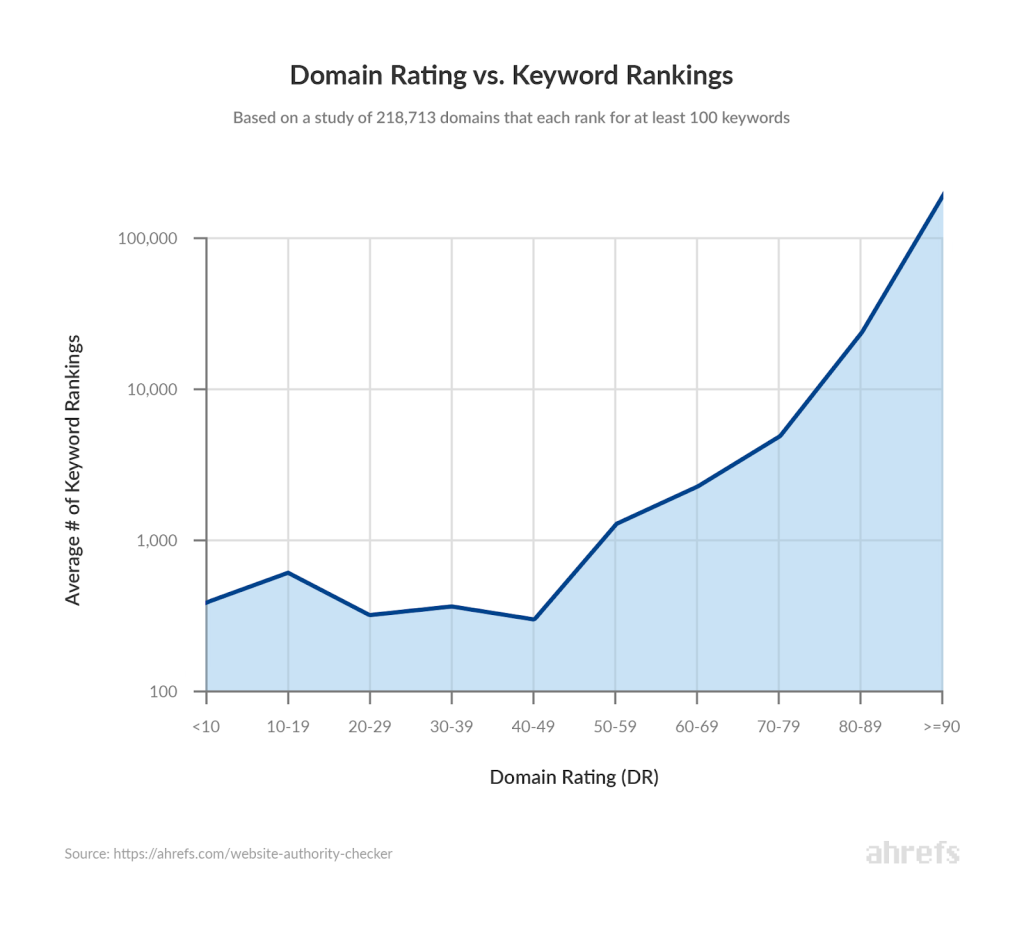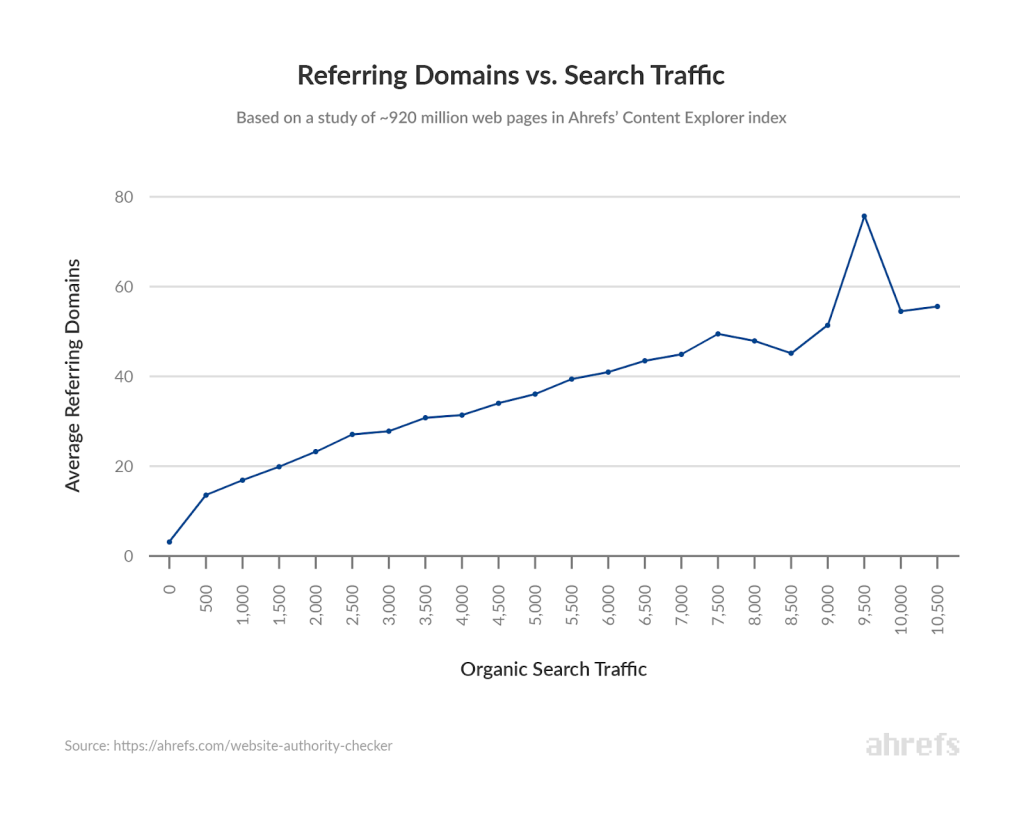What is SEO Authority
SEO authority refers to a website’s or specific page’s strength or credibility. A high SEO authority influences how well a website or page ranks in the search results.
Types of SEO Authority
In total, there are two types of SEO authority: domain authority (DA) and page authority (PA):
Domain Authority (DA)
Moz developed DA and it predicts how well the entire website will rank on search engines. The score is on a scale from 1 to 100; the higher the score, the higher the DA.
It’s important to note, however, that there isn’t an official DA score from search engines like Google. You can only get these scores on SEO tools like Moz, SEMrush, and Ahrefs. They may even have different names, such as Domain Ranking or Domain Score.
These aren’t “Official” scores. However, they do provide website owners a strong indication of how strong their websites are compared to others.
Page Authority (PA)
Moz also developed PA, which predicts how well a specific page will rank on search engines. Again, it’s a score from 1 to 100.
Like DA, PA isn’t an “Official” score measured by Google. It’s an estimated score created by Moz to give website owners an idea of how authoritative certain pages are on their websites.
It’s important to note that PA isn’t used industry-wide in terms of SEO. Other tools like Ahrefs and SEMrush use different wording for PA, but it’s somewhat the same.
Differences Between DA and PA
DA focuses on the domain as a whole, whereas PA focuses on singular pages. Both are important, but increasing your DA will improve your overall site performance.
Just so you know, PA also influences DA. As each of your pages increases in PA, your average PA rating will increase. As a result, your overall website DA will increase.
Why SEO Authority is Important
SEO authority in general, both DA and PA, can provide some great SEO benefits. These include:
More Keyword Rankings
Time and time again, higher DA (a result of higher individual PA) improve keyword rankings.
Recently, Ahrefs studied the difference between what they call Domain Ranking (which is the same as domain authority) and ranking keywords.

As you can see from their research, the higher the domain authority, the higher the keyword rankings, especially when you reach over that DA ranking of 50.
Improved Organic Traffic
More keyword rankings always equals more organic traffic. There’s always a direct correlation.
However, you still need relevant content to rank for keywords. If your content is not relevant, search engines won’t rank you, regardless of your PA or DA.
But it does give you a boost. When you have high DA, and you create a new content asset, compared to others within the niche, search engines will prioritise yours.
Enhanced Credibility and Trust
High PA and DA mean one thing: people trust your content. Because of this, you’ve received backlinks and traffic. Search engines like Google recognise this and reward you in return.
Simply put, if you provide a great experience, even a better experience than others in your niche, Google knows this. And because you offer the “best”, you’ll get the most traffic, keyword rankings, etc.
How is SEO Authority Determined
SEO tools calculate DA and PA over a series of metrics. All of them are slightly different (even in naming), but all have a scoring system of 1 to 100.
For the most part, DA and PA are calculated based on the following:
- Quantity and quality of backlinks
- Estimated monthly traffic
- Number of rankings on SERPs (for DA only)
- Percentage of dofollow domains (Whether it’s natural or not)
- The balance between links and organic traffic
- Number of referring domains with the same IP address
- Number of referring domains with the same IP network
- Is there another domain with an identical backlink profile?
Based on the above, the SEO tool will then give you a rating from 1 to 100 for your PA and DA.
What’s a Good SEO Authority Score?
A “Good” SEO authority score depends on your competitors. If you’re in a highly competitive niche, you’ll need a higher authority score to compete than in a non-competitive niche.
That being said, here are some benchmarks for DA and PA:
- 0 – 30 (Below average)
- 40 – 50 (Average)
- 50 – 60 (Good)
- 60+ (Excellent)
These are just benchmarks, however. Remember, it really depends on your niche and your competition authority score.
How to Increase SEO Authority
After reading the above, you may want to increase your SEO authority. To achieve this, we recommend you follow the below tips:
1. Build Relevant Backlinks
Still, today, backlinks are the king of website performance. Good backlinks, however. Backlinks that are relevant and come from high DA websites with a good backlink profile.
Not only this, they help boost website performance overall. Time and time again, backlinks have been proven to increase keyword rankings and search traffic.

As you can see from the Ahref research above, more referring domains equals more search traffic. This is the same for keyword rankings.
And this all works full circle. As you get more traffic, your authority increases – as you get more backlinks, your authority increases – as you have more keyword rankings, your authority increases.
What is a Valuable Backlink?
High DA or PA shouldn’t be the deciding factor for a backlink. If you’re searching for backlink opportunities, evaluate the “value” of the link by looking into factors like:
- Number of referring domains the website has
- Amount of organic traffic the website is getting
- Number of other websites the website is externally linked to
- How relevant the referring website is to your topic
- The user experience offered by the website (design, content, optimisation, etc.)
This will take you longer to get backlinks. However, the longer it usually takes, the better. As a rule of thumb, the easier the backlink is to get, the less valuable it is.
Please remember – quality over quantity. A backlink from a high DA website that doesn’t fulfil the above variables won’t improve authority.
2. Update Content Regularly
Don’t get us wrong, backlinks are important. However, you should never neglect content. Without quality content, backlinks don’t mean much. There needs to be a decent balance.
Having quality content is very important. But it also needs to be updated. Search engines love this, especially for evergreen content.
Updated content boosts SERP results, which indirectly will attract more visitors and backlinks, boosting PA and DA.

This isn’t just for this one keyword, either. It’s for all keywords. For the most part, you’ll always see content that has been updated within the year listed on the first page of the search.
3. Increase Popularity
Search engines look at popular pages as trustworthy sources. There’s a reason people are visiting these pages more than others.
Because of this, you need to increase the popularity of your website and/or a specific page. And you don’t only need to do this via ranking. There are other ways you can do this also.
- Internal linking
- Social media marketing
- Offline advertising
- Online communities and forums
- Public relations
- Paid advertising (Search)
- Collaborations and partnerships
- Referral programs
The list goes on and on. The goal is to just drive more traffic to your website or page. By doing this, you’ll increase traffic (of course) and also the likelihood of other important metrics like backlinks.
As an indirect response to this, your PA and DA will increase over time.
Focus on User Experience
Lastly, focus on the most important part of your website – the users. User experience is a huge factor in SEO. For rankings, PA, and DA – for literally everything.
If search engines like Google see you’re pleasing your users, you’ll be rewarded. It’s always the case. Google rewards websites that look after their users, providing them with a flawless experience time and time again.
Therefore, understand your users and remove any bottlenecks on your website. Make it a smooth and seamless experience to improve their satisfaction.
Final Word: Build Your Authority in SEO!
After reading the above, you should have a good understanding of SEO authority. As you can see, it plays an important role in SEO.
This importance will continue into the future, even through new Google Core Updates. It follows some simple pillars: authority, relevance, and experience, which are all top-ranking factors for search engines.
So, start increasing your SEO authority today. Go for quality backlinks, create great content, keep your website updated, and provide a superb user experience.
By doing this, you’ll increase PA and DA and start outranking your competition.

